Acesse a sua conta getAbstract para obter o resumo!

Acesse a sua conta getAbstract para obter o resumo!
Greg Lukianoff and Jonathan Haidt
The Coddling of the American Mind
The Atlantic, 2015
Sobre o que é?
“Microaggressions” and “trigger warnings” are symptoms of a new era of anxiety on college campuses.
Recommendation
Traditionally heralded as a place to think, grow and learn, academia today increasingly faces accusations of “microaggresions.” And professors find themselves compelled to give students “trigger warnings,” for fear that certain topics will bring up negative feelings. Social psychologist Jonathan Haidt and CEO Greg Lukianoff delve into the growing phenomenon wherein student politics is clamping down on free speech and robbing young people of the opportunity to learn how to cope with opinions different from their own. getAbstract recommends this intriguing analysis to all university staff and students, as well as parents about to send their children off to college.
Summary
About the Authors
Greg Lukianoff is CEO of Foundation for Individual Rights in Education. Social psychologist Jonathan Haidt, PhD, is an ethical leadership professor at NYU-Stern School of Business.





















Comment on this summary